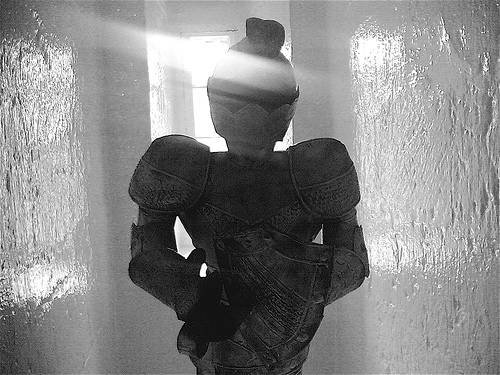We run our website the way we wished the whole internet worked: we provide high quality original content with no ads. We are funded solely by your direct support. Please consider supporting this project.

Put on the Armor of God
The whole of the Christian life is an act of war against the enemy as we follow Jesus in storming the gates of hell (See post.) No passage better illustrates this than Paul’s metaphor of spiritual armor from Ephesians 6. He writes that Christians are to “be strong in the Lord and in the strength of his power” which means putting on “the whole armor of God, so that you may be able to stand against the wiles of the devil, … against the rulers, against the authorities, against the cosmic powers of this present darkness, against the spiritual forces of evil in the heavenly places” (Eph 6:10-12).
For this reason, “truth,” “righteousness,” “the gospel of peace,” “salvation” and the “word of God” are all portrayed as various aspect of the “whole armor of God” used by Christians to ward off demonic attacks (Eph 6:14-17). Paul associates each with a different piece of armor in this way:
- The belt of truth
- The breastplate of righteousness
- Feet fitted with the gospel of peace
- Helmet of salvation
- Sword of the Spirit which is the word of God
In addition, faith itself is portrayed as a “shield” by which we “quench all the flaming arrows of the evil one” (6:16).
With all of this armor, Christians are to “stand firm.” The first charge is to “hold your ground against” an assailing force, while the second is to be ever watchful of an ever-present enemy. The battle motif here is thick, one that pervades the whole of the Christian life.
While Paul does not specifically mention prayer as part of the Christian’s armor, in this context it is most certainly seen as a warfare strategy, just as it was in the teachings of Jesus. Immediately after mentioning “the word of God” as the “sword of the Spirit” Paul adds “Pray in the Spirit at all times in every prayer and supplication” (6:18). Then he adds, “To that end keep alert and always persevere in supplication for all the saints.”
The injunction to “keep alert” while we pray is a clear indication that prayer is here portrayed as something a soldier does. It is, in short, an act of war.
This war motif is common in Paul’s writings. He tells Timothy to “share in suffering like a good soldier of Christ Jesus” and reminds him that “no one serving in the army gets entangled in everyday affairs; the soldier’s aim is to please the enlisting officer” (2 Tim 2:3-4). He writes of “fighting the good fight” (1 Tim 1:18; 6:12), about “waging war” (2 Cor 10:3), and charges us to “lay aside the works of darkness and put on the armor of light” (Rom 13:12).
For too long, the church has viewed this war motif as being incidental to the New Testament. Whether the motivation be to minimize the “mythological” elements of the NT or to maximize the classical model of God’s control by downplaying this battle language, we must recognize that the warfare motif is central. God’s conflict and victory over Satan lies at the heart of the Gospel and shapes what it means to be a follower of Jesus in this fallen world.
—Adapted form God at War, pages 281-283
Photo credit: wili_hybrid via Visual hunt / CC BY-NC
Category: General
Tags: Faith, Kingdom Living, Prayer, Satan, Warfare Worldview
Related Reading

Friday Lights: Living the Best Day Ever
Each Friday we post content sent to us by our readers that is inspiring, funny, lighthearted or just generally fun. If you’d like more information on submitting content for this feature you can get more information here. Today’s post comes to us from Brandon Andress. This is a post from last December from his website. Very inspiring.…

Why Did God Require Animal Sacrifice in the Old Testament?
Question: I have a question about the atonement. Why did YHWH in the OT demand that people sacrifice animals? And if these sacrifices anticipated the ultimate sacrifice of the Messiah, as the author of Hebrews says, doesn’t this imply that Jesus’ death was necessary for God to forgive us? But why would God need his…

Loving the Unlovable
Mother Teresa had a prayer she spoke each day that enabled her to minister effectively: Dearest Lord, may I see you today and every day in the person of your sick, and whilst nursing them, minister unto you. Though you hide yourself behind the unattractive disguise of the irritable, the exacting, the unreasonable, may I…

Life to the Full
What does it mean to live life to the full? Greg addresses this question in this short video by The Work of the People.

Podcast: Can Satan Heal People?
Greg considers whether Satan has the ability to heal people. http://traffic.libsyn.com/askgregboyd/Episode_0268.mp3

Thou Shalt Not Fear Science-Part II
Yesterday I called your attention to Bev Mitchell’s essay in which he integrated science and theology as he reflected on power and love. This is part II of his essay and it’s on the limiting conditions of creation. It’s a fascinating speculative reflection on why God’s creation is the way it is and what our role is in…
